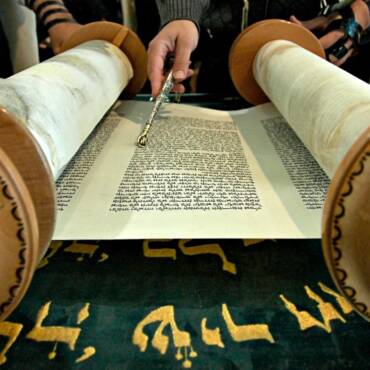Messiah Has All Authority

We tend to be suspicious of authority, as the very idea seems to require that one give up independence and autonomy so as to be exploited by others. But lack of authority has also led to an increasingly fractured world.
Who Deserves Authority?
Perhaps the relevant question is: Who actually deserves authority? And what is the relationship between unity and authority?
Genesis 49:10 reveals that the secret to unity and community is found in obedience to God revealed in His Messiah. The scepter shall not depart from Judah, nor the ruler’s staff from between his feet, until Shiloh comes and to him shall be the obedience of the peoples.
In this text, Jacob was prophesying regarding what would befall his sons be’aharit hayamim, “in the last days” (Gen. 49:1). The Targum, or ancient Jewish translation, adds “for he was revealing to them all that was going to occur at the time of Messiah.”
Jacob bestows sovereignty on Judah, prophesying his future greatness and leadership over the tribes.
David’s Greater Son
Another Targum expands on Genesis 49:10: “The transmission of dominion shall not cease from the house of Judah, nor the scribe from his children’s children, forever, until the Messiah comes, to whom the Kingdom belongs, and whom nations shall obey” (Sanhedrin 98b, Genesis Rabbah 97-99, Lamentations Rabbah 1:51).
In other words, the tribe of Judah would become the leader officially through David and ultimately in David’s greater son, Messiah. Why was Judah given authority and not any of Jacob’s three elder sons mentioned in the verses before?
The narrative shows the reason. Judah had suggested that Joseph be sold into slavery instead of being killed (Gen. 37:26)
But later Judah took the initiative in repenting of this sin and by contrast he then was willing to sacrifice his own freedom for his younger brother Benjamin (Gen. 44:33).
God, through Jacob’s prophecy, honors Judah with leadership, for repenting and being willing to sacrifice himself as a substitute for his family (1 Chron. 5:2).
Judah himself foreshadows Messiah’s sacrifice for us, even as Messiah’s rule is only a blessing for the truly repentant. Biblically, authority is never to be used for selfish purposes, but is for the building up of others.
Judah’s Authority
This leadership is described in Genesis 49:10 by the word shevet, a “rod or scepter”, signifying capital and executive authority, and chakak, meaning “lawgiver”, signifying judicial and legislative authority. Within the people of Israel, this authority was Judah’s, even after the Babylonian captivity.
Throughout Scripture, God put prophets, priests and kings in charge to guide and rule until Messiah, for He is the perfect Prophet, Priest and King. All Jewish authority culminates in Messiah.
The timing indicated by the word “until” needs to be seen in a historical context. The Talmud relates, “Forty years before the destruction of the Temple, the Sanhedrin did not judge in capital cases” (Shabbat 15a). In John 18:31, the Judeans said, “We’re not permitted to put anyone to death.”
Today, the tribe of Judah has, for millennia, been completely assimilated with the other tribes, and since the Dispersion, we no longer have records for determining this tribal affiliation.
The Lion of Judah
Hence, if the Messiah described in Genesis 49:10 did not already arrive, the verse can no longer be fulfilled, and the scepter would have departed.
Yet, on the contrary, Messiah – the Lion of Judah – lives and reigns! The timing prophesied here reveals Yeshua for Who He is.
“Shiloh” was rendered as a personal name in the Talmud (Sanhedrin 98b). There are many names for Messiah in Scripture, such as Immanuel, or “God with us” and Adonai Tzidkenu, or “the Lord our Righteousness.”
Each name represents another aspect of His character or ministry. Shiloh describes His authority, as testified by the ancient versions which translate the Hebrew “to whom it belongs.” Judah held the leadership prophetically awaiting Messiah.
Moreover, all authority, whether ecclesiastic or rabbinic, is illegitimate unless it genuinely exalts Messiah’s authority. Yeshua has all authority in heaven and earth.
The Jewish Messiah
At His return, everything will be surrendered to Him, and all human authorities will have to give an account. Even the nations reverently yield to the Jewish Messiah: the obedience of the peoples (yeqqehat amim).
This continues and clarifies the promise of the Seed through Abraham in whom all the nations and families of the earth would be blessed (Genesis 12:3; 22:18).
The involvement of the Gentiles (nations) does not undermine but confirms the truth of Messiah’s Jewish credentials. Thus, this prophecy illustrates how diverse peoples find unity in their obedience to Messiah.
It is not through losing our distinctiveness and diversity, but through trusting in His leadership that brings victory. Respond by faith to Messiah and follow His word, for to Him is “the obedience of the peoples.”




Add Comment